Salò, or the 120 Days of Sodom Blu-ray Movie
HomeSalò, or the 120 Days of Sodom Blu-ray Movie 
Salò o le 120 giornate di SodomaBFI Video | 1975 | 117 min | Rated BBFC: 18 | Oct 02, 2008
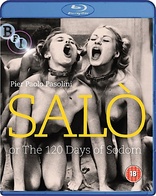
Movie rating
6.7 | / 10 |
Blu-ray rating
| Users | 3.2 | |
| Reviewer | 5.0 | |
| Overall | 4.7 |
Overview
Salò, or the 120 Days of Sodom (1975)
In World War II Italy, four fascist libertines round up nine adolescent boys and girls and subject them to 120 days of physical, mental, and sexual torture.
Starring: Paolo Bonacelli, Giorgio Cataldi, Hélène Surgère, Caterina Boratto, Aldo VallettiDirector: Pier Paolo Pasolini
| Foreign | Uncertain |
| Drama | Uncertain |
| Erotic | Uncertain |
| War | Uncertain |
| Thriller | Uncertain |
Specifications
Video
Video codec: MPEG-4 AVC
Video resolution: 1080p
Aspect ratio: 1.85:1
Original aspect ratio: 1.85:1
Audio
Italian: LPCM Mono
English: LPCM Mono
Subtitles
English, English SDH
Discs
25GB Blu-ray Disc
Two-disc set (1 BD, 1 DVD)
Playback
Region B (locked)
Review
Rating summary
| Movie | 5.0 | |
| Video | 4.5 | |
| Audio | 5.0 | |
| Extras | 5.0 | |
| Overall | 5.0 |
Salò, or the 120 Days of Sodom Blu-ray Movie Review
Reviewed by Dr. Svet Atanasov September 30, 2008Arguably the most controversial film ever made, Pier Paolo Pasolini’s ”Salò o le 120 giornate di Sodoma” (1975) arrives on Blu-ray courtesy of the BFI (British Film Institute). Violent, explicit and shocking, the film has generated more controversy during the years than any other cinematic work ever made.
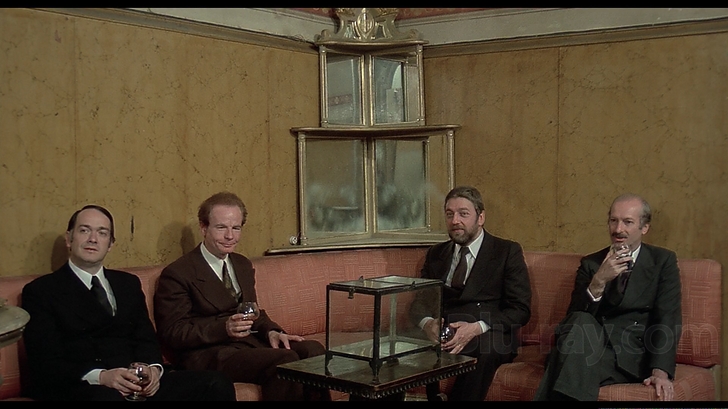
The faces of evil
Fascist Italy, 1944. Somewhere on the outskirts of Salo. Sixteen beautiful boys and girls are captured and locked into a secluded villa guarded by armed soldiers. Four dignitaries, assisted by four middle-aged women, will unleash a horrific sadistic ball during which their captives will be sexually humiliated and then tortured.
In the Circle of Manias, the dignitaries will be aroused by erotic stories before they indulge into perverted sexual acts.
In the Circle of Shit, the dignitaries will succumb to their most despicable fantasies. They will eat and then feed to others their own excrement.
In the Circle of Blood, the dignitaries will punish their victims according to a set of rules they have accepted.
Based on Marquis de Sade’s 120 journées de Sodome, Pasolini’s Salo is a film impossible to critique. Its narrative and graphic imagery defy everything human beings have come to accept as human. Its core is built on evil, despondency and humiliation impossible to rationalize, let alone critique. Yet behind the graphic tortures and sadistic acts Salo reveals, some believe lies a message in support of humanity; a weak, hurt and dying hope that if faced without fear evil could be defeated.
If approached as the final work of a director disgusted with man's progress and a desperate exploration of the destructive culture of superiority and man’s thirst for power, spiritual and physical, Salo does indeed succeed in forcing the viewer to seriously ponder the origin and nature of evil. But it does so in such an uncompromising fashion that the viewer eventually feels that he has been assaulted as much as the poor boys and girls the fascists bring to the villa.
Many have claimed that Salo is a symbolic film reuniting politics with sensationalism eased by images of human degradation unseen in other films with similar agendas, but I disagree. No one, not even Pasolini, could have afforded to go this far to simply propagandize a political ideology (Salo isn’t entirely truthful to Sade’s 120 journées de Sodome either) that would contradict the very message his film delivers. No, Salo is a personal film free of political allegories and cheap sensationalism. Salo is an unconditional rejection of power and those who pursue it, regardless of who or what they are, or what they represent.
Unsurprisingly, throughout Salo the fascists become intoxicated with power while citing the words of Nietzsche, Klossowski, and Sade (not coincidentally all writers and philosophers who have decried the existence of God). Power, as embraced and abused by the fascists, Pasolini argues proves human kind's inability to confront its own weaknesses. And indeed, the victims' behavior as well as their acceptance of the unspeakable perversions initiated by the fascists proves that defeat is inexorably linked to power - hence the reason why both Sade’s 120 journées de Sodome and Salo culminate in horrific scenes depicting grotesque violence and self-destruction.
Even though Pasolini’s film takes us back to the last days of Fascist Italy, its message isn’t dated. On the contrary, it is as urgent as it has ever been. After Darfur, Rwanda, and Bosnia it is that much clearer that evil is part of human nature. It is in us, waiting to be given a chance to corrupt our souls.
Note: Pasolini did not live to see Salo released theatrically. He was killed on November 2, 1975, in Ostia, near Rome, supposedly by a male hustler. In recent years, however, it has been speculated that his death was ordered by powerful men who disliked his leftist views.
Salò, or the 120 Days of Sodom Blu-ray Movie, Video Quality 
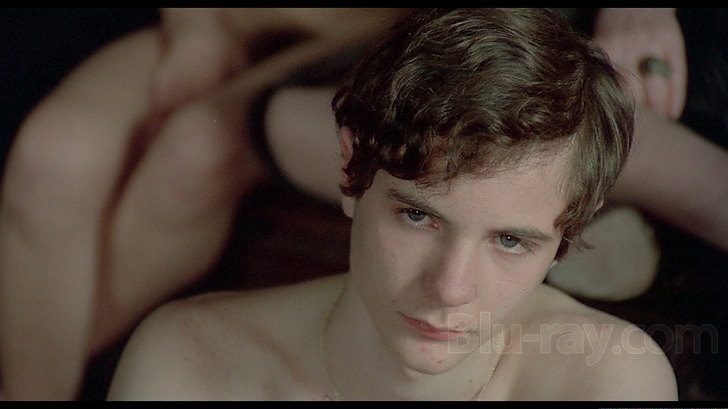
Note: If looking for the best presentation of Piere Paolo Pasolini's Salo currently available on the market, please consider Criterion's Region-A release reviewed here.
Presented in its original aspect ratio of 1.85:1, encoded with MPEG-4 AVC and granted a 1080p transfer, Salo is the first high-definition release from the BFI (British Film Institute). Having been fully remastered from the original Italian negative, this brand new high-definition release is almost too good to be true. Certainly given the exorbitant prices that followed the original Criterion disc (a fairly poor presentation, which had more value as a collector's item than as a strong and accurate replica of Pasolini's film), I am thoroughly impressed by what the BFI have managed to put together.
I would like to quote a short description provided in the massive booklet for this release as there have been all sorts of insinuations and speculations as to how and where the new high-definition transfer the BFI have used was struck. I hope that the following information courtesy of James White, technical producer of mastering and restoration at BFI, will answer any possible questions there might be pertaining to the BFI and their treatment of Salo:
"Salo has been newly restored in Hi-Definition using the original 35mm negative film elements and appears in its original 1.85:1 ratio with restored mono 2.0 sound.
Salo was restored using HD-DVNR and MTI restoration systems, removing dirt, scratches and stabilizing the image. Every effort has been made to present Salo in its pristine, original form. However, a small number of instances of damage on the original film elements will exhibit occasional image weave and flutter due to slight warping and sprocket wear.
In order to present Salo in its complete and uncut form, this edition includes a brief scene which was cut from the original negative and is only available in a 35mm print held at the BFI National Archive. Although efforts have been made to make this inserted material consistent with the overall feature, the noticeable contrast in image quality is due to the difference in source material. As with the majority of Italian films during this time all audio was recorded after filming and synched during post-production and therefore the film appears to exhibit occasional "loose synch" issues. This is true to the film's original release and is not a technical fault. "
The Blu-ray looks spectacular. The freshly remastered image brings a great deal of detail that undeniably overshadows every other SDVD release of the film that I have seen before. From the close-ups studying the faces of the storytellers to the opening scenes at the villa to the horrific finale, this new high-definition transfer looks very strong. Furthermore, there is a sizable discrepancy between the color scheme seen on the recently released Criterion SDVD and that of the Blu-ray release. Greens, yellows and blues reveal a notably different complexion, which affects significantly the overall composure of the film. Contrast is also undoubtedly superior -- a great example is the wedding sequence where the color scheme looks dramatically improved. There isn't any contrast boosting or subtle external manipulations that I could detect either. Finally, the Blu-ray disc does not reveal DNR manipulation of any sort, just a pure, unfiltered image replicating as best as possible Pasolini's vision. As a result, the high-definition transfer has retained the original grainy structure present on the film negative. Needless to say, this is a terrifically looking, natural, and surprisingly fresh presentation that I must conclude is the best looking release Salo has ever been granted.
Salò, or the 120 Days of Sodom Blu-ray Movie, Audio Quality 
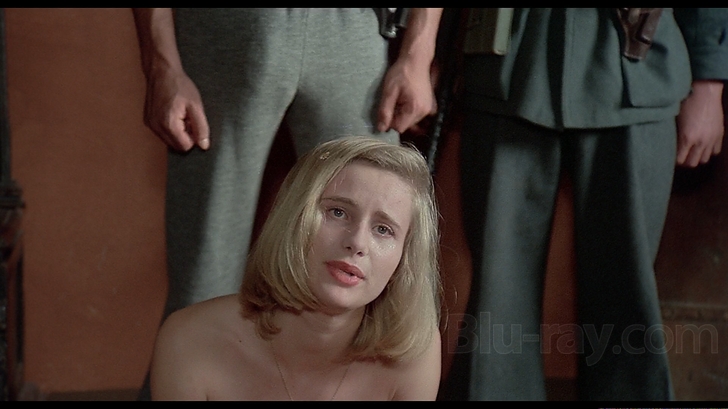
This Blu-ray disc offers two audio options: one could either view Salo with its original Italian mono track and added forced English subtitles or opt for the English version which eliminates the Italian mono track (the Italian track is 48k/24-bit while the English dub is 48k/16-bit). And both of these are terrific! I personally opted for the Italian track and suffice to say everything here appears to have been handled with utmost precision. What immediately impresses is the clarity of sound. Obviously there has been some extensive restoration work done here as balance is very good (those of you who have seen a fair share of Italian films from the same era know that a lot of these productions reveal unevenness in the audio department primarily due to the secondary overdubbing) as is the quality. This being said the dialog in Salo is very easy to follow and I could not detect any disturbing hissing, cracks, or pop-ups. The English subtitles are also very well done, preserving the integrity of the often disturbing original Italian dialog.
Salò, or the 120 Days of Sodom Blu-ray Movie, Special Features and Extras 
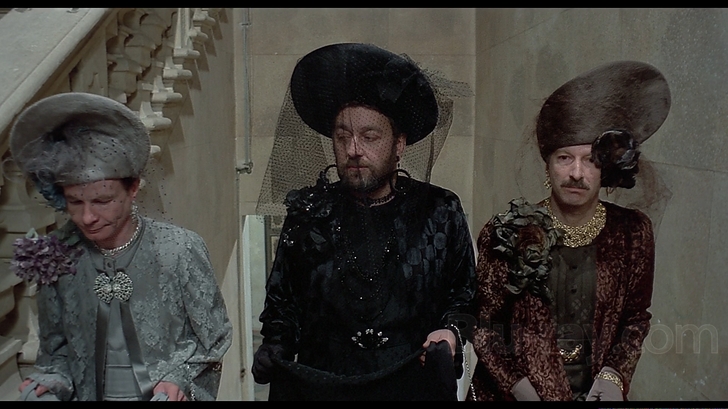
BFI have done an outstanding job with the supplemental materials. First of all the British distirbs have practically included an entire small book here as their "booklet" boasts a total of 60 pages full of revealing information about the history of Salo and its creator. First, there is a great introduction by Sam Rhodie titled simply "Salo – An introduction", which puts in perspective Pasolini's entire body of work before it touches upon its most scandalous creation. Next is an equally fascinating essay by Gideon Bachmann titled "Pasolini and the Marquis de Sade", which goes in great detail deconstructing Salo and its production history. There are terrific revelations pertaining to Pasolini's political beliefs and the manner in which his work was perceived. The entire essay is broken into days as to follow the production cycle. Next is a thoughtful review by Gilbert Adair, arguably one of the best the film has ever received, which originally appeared in Monthly Film Bulletin, in September of 1979. Here the reviewer provides a number of terrific points of view as to what transforms Salo into a disturbing film. Next you will find an elaborate history of the censorship Salo suffered during the years in the United Kingdom. Additionally, there is the infamous letter by James Ferman (British Board of Film Censors) titled "Letter from the BBFC to the Director of Public Prosecutions in 1979". Next you will find the text to Coli's "Ostia – The Death of Pasolini", which brings us back to the mystery surrounding the Italian director's murder. Finally, there is an autobiographical essay by Geoffrey Nowell-Smith, which summarizes Pasolini's life by highlighting important events from his career as a director and outspoken poet, novelist, and controversialist.
On the Blu-ray disc you will find the original theatrical trailer for Salo as well as "Ostia – The Death of Pasolini" by Coli. This is the band's legendary 1996 track, which has received a new video accompaniment produced especially for BFI's release.
On the second disc (a standard DVD) offered in this spending package you will find a number of exciting supplemental materials. First is "Open Your Eyes!" (2008), on-set documentary of approximately 21 minutes containing archival footage showing Pasolini as he directs and instructs the cast during the horrific final scene of Salo. In addition, there are sporadic comments by the actors revealing what it means to work with the Italian director on such a controversial project. Next is the "Walking with Pasolini" documentary (2008) of approximately 21 minutes in which Neil Bartlett, David Forgacs, Noam Chomsky, and Craig Lapper discuss Pasolini's work and recall their personal experiences with the film. The documentary also offers interesting BBC archival footage. Next is another documentary titled "Fade to Black"(2001) narrated by Mark Kermode, which focuses on the contemporary resonance of Pasolini's work as well as some of the controversy surrounding his murder. Next is arguably the best supplemental bit the release contains titled "Whoever Says The Truth Shall Die" (1981), running at approximately 60 min. This is the most complete, most detailed, and most in-depth analysis of Pasolini's work I have seen, allowing one to truly immerse into the controversial personal world of the Italian director. Finally, the disc also offers the short film "Ostia" (1987), which recreates the most controversial and shrouded in mystery part of Pasolini's life, starring Derek Jarman.
Salò, or the 120 Days of Sodom Blu-ray Movie, Overall Score and Recommendation 
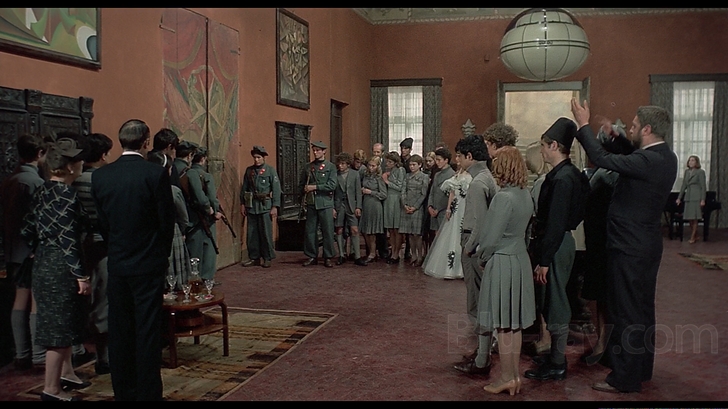
Arguably the most controversial film ever made, Pier Paolo Pasolini's Salo has finally received the kind of treatment every important film deserves. The British Film Institute (BFI) have put together a lavish package that is nothing short of astounding. This is exactly the elaborate and complete Blu-ray release I was expecting, and suffice to say, my expectations have been convincingly met. Bravo BFI!
Other editions
Salò, or the 120 Days of Sodom: Other Editions

Salò, or the 120 Days of Sodom
Salò o le 120 giornate di Sodoma
1975

Salò, or the 120 Days of Sodom
Salò o le 120 giornate di Sodoma
1975
Similar titles
Similar titles you might also like

Rome, Open City
Roma, città aperta
1945

Satantango
1994

The Club
El Club
2015

Red Desert
Il deserto rosso
1964

The Ascent
Восхождение / Voskhozhdenie
1977

Germany, Year Zero
Germania Anno Zero
1948

Paisà
Paisan
1946

Identification of a Woman
Identificazione di una donna
1982

Stalingrad
20th Anniversary Edition
1993

Europa
Zentropa
1991

The Decameron
Il Decameron
1971

The Canterbury Tales
I racconti di Canterbury
1972

Hands Over the City
Le mani sulla città / Masters of Cinema
1963

Throne of Blood 4K
蜘蛛巣城 / Kumonosu-jô
1957

The Turin Horse
A Torinói ló
2011

A Man Escaped
Un condamné à mort s'est échappé ou Le vent souffle où il veut
1956

Lady Vengeance
친절한 금자씨
2005

Sympathy for Mr. Vengeance
복수는 나의 것
2002

The Battle of Algiers
4K Restoration | La battaglia di Algeri | Collector's Edition
1966

La Dolce Vita
1960